 |
 |
 |
 |
 |
 |
 |
 |
 |
Inter Cities Fairs Cup final second leg - Nep Stadium - 76,000
Scorers: None
Ferencvaros: Geczi, Novak, Pancsics, Havasi, Juhasz, Szucs, Rakosi, Szoke (Karaba 60), Varga, Albert, Katona
Leeds: Sprake, Reaney, Cooper, Bremner, Charlton, Hunter, O'Grady, Lorimer, Jones, Madeley, Hibbitt (Bates 68)
The game had been in grave danger of being cancelled following the Soviet
invasion of Czechoslovakia and the unrest this had caused in central Europe. Cold War tensions were still rumbling between the United States and the
Soviet Union. Earlier in the year, Antonin Novotny had lost control of
the Communist Party of Czechoslovakia to Alexander Dubcek, who launched
a programme of liberalisation in an attempt to revive the country's economic
fortunes. Leonid Brezhnev, the Soviet leader, was concerned that Dubcek's actions
would weaken the Communist Bloc's position and decided on radical measures.
On the night of 20 August, Eastern Bloc armies from five Warsaw Pact countries
invaded Czechoslovakia. During the invasion, Soviet tanks occupied the
streets. They were followed by hundreds of thousands of troops and 72
Czechs and Slovaks were killed and hundreds wounded during the troubles. There was widespread anger throughout the western world, but the only
response was written and vocal criticism - the reality of nuclear stand
off meant they were in no position to challenge Soviet military force
in central Europe. In an attempt to 'forestall Despite dire warnings, there was no doubt about United's willingness
to travel to Hungary. They had come too far to be denied at this stage.
Don Revie used his weekly column in the Yorkshire Evening Post
to lay out the club's position. 'We will be condemned by many people for not refusing to play the Hungarian
champions in view of what has happened recently in Czechoslovakia. Much
has been written and said about the ways in which the western world can
show its disapproval. Sadly, soccer is being used as a weapon in the political
arena. 'Celtic, who were due to meet Ferencvaros in the first round of the European
Cup this season, threatened to boycott the match because of the Czech
crisis. They asked UEFA not to force clubs to meet sides from Warsaw Pact
countries, and as a result all Eastern and Western Europe countries, paired
in the Champions Cup and Cup Winners' Cup, have been separated in the
draw. 'Politics? I prefer to leave this to the politicians. This does not mean
I do not feel strongly about what has happened in Czechoslovakia - but
I feel that political opinion should not be allowed to interfere in any
way with sport. Boycotting matches against Communist countries is the
easy way out. Surely trying to beat them on the soccer field is a better
way to show one's distaste. 'I believe we have the ability to win, although I would have liked to
go to Budapest with a bigger lead than the 1-0 margin we established in
the first leg. The Hungarians did not set Elland Road alight with their
attacking play, but I know from past experience that on their own ground
some continental sides have the ability to let all hell loose. 'The Hungarians are probably the finest passers of a ball in the game.
They have always been adept at playing one two football … their forwards
have the ability to create chances with bouts of first time passing in
confined areas. When up against this type of football, it is essential
to stick to the man and avoid the temptation of following the ball. It
is someone else's responsibility to pick up the player for whom the pass
is intended. 'A very difficult match is ahead of us. We know how formidable the Ferencvaros
attackers are. We expect them to produce some fireworks. But Leeds has
proved time and again that its defence can stand its ground in the hottest
moments. 'In the past we have produced some of our most masterful football away
from home - particularly in Valencia, Leipzig and in Budapest, too. That
was against Ujpest Dozsa. Against Ferencvaros at Elland Road I was most
impressed with their defence. But now for a change they must worry about
us. The onus is on them to score. If we score one then they must score
three to beat us. For in this competition if the teams are level on the
goal aggregate, the away goals count double.' With Johnny Giles (knee) and Eddie Gray (ankle) unavailable through injury,
and Jimmy Greenhoff, who had played
in the first leg, now at Birmingham, Revie drafted Mike
O'Grady and Terry Hibbitt into
his starting line-up. Revie's counterpart, Dr Karoly Lakat, the coach of Ferencvaros, a history
teacher and one time left-half with the Hungarians, said before the game,
'We are faced with a difficult match as we have to win by a Lakat made only one change from the first leg. Fenyvesi, a 35-year-old
veterinary surgeon, with 26 appearances for Hungary, stepped down to make
way for Katona, regarded as 'a more thrusting outside-left'. Those who were not fully converted to the Leeds cause were of the opinion
that the world class Ferencvaros attack would be simply too strong for
even United's powerful defence to withstand. There had been enough flashes
in the first leg to leave little doubt as to the threat Florian Albert
and his men represented. But Don Revie was confident in his men and had attacking options - Mike
O'Grady on the right and Terry Hibbitt on the other flank would be outlets,
and Terry Cooper's attacking sorties were becoming legendary, while Peter
Lorimer was always a threat from distance with his power shooting. Nevertheless,
Revie's tactics were founded on a smothering defensive barrier across
midfield, for the most part leaving Mick Jones alone up front to forage
for scraps. It was a style that United had perfected over three hard years
of Fairs Cup competition and had proven an effective option. The Nep Stadium was a magnificent venue for a historic occasion, and
the Leeds team strode out determined not to yield an inch. Gary Sprake: 'Although my recollection of some games is beginning to
fade somewhat, the game at the Nep Stadium remains etched in my memory
to this day. I remember walking out of the tunnel to be greeted by a crescendo
of noise and the atmosphere was unbelievably hostile. The political situation
behind the Iron Curtain was very tense at that time and for the 76,000
Hungarian fans in Budapest it was one of the few chances they had to express
and show their feelings in public. They certainly did that with their
hostility focused directly towards us.' Ferencvaros were straight onto the attack, and committed themselves to
all out assaults on Sprake's goal. Whether by design or not, United dropped
straight into a thoroughly defensive game, packing their box and funnelling
back behind the ball whenever danger threatened, which was virtually a
constant. For all that, the Hungarians struggled to pose any direct threat
and it was 16 minutes before a real goal attempt was made, so tight was
the United covering. Then Rakosi made his way into the United area through
a host of white shirts and got in a shot. Billy Bremner: 'He was wasting his time - Terry Cooper made it look easy,
as he cleared the ball with a seemingly nonchalant overhead kick, though
I breathed a bit more freely when I saw that Terry's move had come off,
I can tell you. It was Terry to the rescue again a few minutes later,
when Albert sent in a hard, During that opening 20 minutes, the Leeds defenders had been all calm
confidence, coolly averting attacks and taking pains to retain what little
possession they had. The green-shirted Hungarians were swarming all round
them, penning them back into their area, but calm Yorkshire heads were
everywhere. There were no panicky clearances, inviting Ferencvaros back
onto the offence, and United grew in assurance. They broke out in the
35th minutes to earn a free kick wide on the right flank, giving Jack
Charlton the opportunity to make one of his customary advances. The Hungarians
had seen enough of the defender's aerial dominance in the first leg to
know the threat he offered at dead ball situations. It was his challenge
that led to the goal at Elland Road. With the attention focused on Charlton, Jones was given the space to
meet O'Grady's free kick and his high looping header dropped onto the
bar before going behind. It was a clear demonstration that Ferencvaros
dare not take Leeds lightly, especially as O'Grady was probing constructively
down both wings. Two more shots followed in quick succession, though keeper
Geczi parried them both. These were rare moments of relief as United were forced to defend in
depth, with the majority of the game played in their defensive third,
and Albert and Varga conspicuous in attack. Nevertheless, the hard working
Leeds defenders seemed to have found the measure of the Ferencvaros forwards,
reading their every intention almost before they made their move. The
front line were among the world's best, but had encountered nothing like
this resolute defence. Even with Novak and Szoke controlling the right
flank and Varga and Rakosi the other, giving defender Juhasz the opportunity
to join in, Ferencvaros could find no way through or round a white wall. Bremner: 'As soon as the whistle had gone to signal the start of the
second half, we were thrown back once more, as right winger Szoke hared
down the line and whipped in an angled shot to which Gary Sprake leaped
for a brilliant save. Then we were caught out when one of the Ferencvaros
forwards slipped into our penalty area, kept on running, but made a smart
back pass for a team mate to collect. For a few seconds we really were
all at sea, but the danger was soon over - the shot went harmlessly wide.' Rakosi sent in a first time shot from a high Varga centre, but again
the shot was wide. Sprake had to save with his feet from Szoke, making
one of his final contributions. The Ferencvaros attacks were like a wave
and on the hour they sought to give themselves fresh impetus, bringing
on Karaba to replace him. Eight minutes later, Don Revie made a tactical
switch, replacing the tiring Hibbitt with Mick Bates as the Hungarians
continued to press. There had been signs that Leeds had weathered the best that the Hungarians
could throw at them, but now Ferencvaros found a second wind and intensified
their efforts to snatch a precious equaliser, forcing a succession of
corners and hemming United into their own box. Most of the chances that had fallen to Ferencvaros had gone to Rakosi,
but he was found wanting when they arose. As the game entered its final
ten minutes, the Ferencvaros attacks grew more focused and intense with
thrusts coming from everywhere. In the 86th minute, the Nep rose as one as Varga cut in from the left
to beat Sprake, but United were reprieved when West German referee Schulenberg
ruled the goal offside. Then Bremner had to clear from Albert, Varga's
overhead strike just beat the post and Sprake was forced to dive at Albert's
feet to deny him a shot. Geoffrey Green in The Times: 'In the second half Leeds were camped
in their own half as the Hungarians threw all their efforts into trying
to make the breakthrough. But Leeds held their lines superbly and twice
were saved by dazzling saves by Sprake under his crossbar. First he kept
out a close range effort from Szoke with his left foot, and then he dived
with poetic grace to turn away a free kick from the edge of the penalty
area to his top corner from Novak. How the goalkeeper ever saw the ball
at that moment was miraculous, since there was a solid wall of ten white
shirts in front of him.' Phil Brown in the Yorkshire Evening Post: 'It was the save of
the match … His shot was of such ferocious strength that it required of
Sprake the riskiest save of all - a diving one-handed punch. If Sprake
had tried to push that ball out with an open hand he would probably have
had that hand in splints today. Instead, his lithe leap and powerful punch
out sent the ball whirling away high round the post in what will be one
of the saves of a lifetime, however long he plays.' Gary Sprake: 'Our defence that night was 'I was still feeling the pain in my wrist when minutes later the referee
blew for full time and we had won our first European trophy. Although
I felt that I had more than helped us to win the cup it was a fantastic
defensive effort from every player and Terry Cooper had a brilliant game.
He was everywhere and even cleared one off the line. I think this game
was the only really consistently good report I got off the national press
who were especially complimentary of the Novak save. Looking back, these
two games still give me great memories but if push comes to shove I do
think that the away performance in Budapest was my best ever performance.
It is certainly one that gives me immense pride.' The save from Novak was the finest moment of Gary Sprake's footballing
career and it signified almost symbolically that Ferencvaros' challenge
was exhausted. They had thrown everything they could at United's stonewall
defence for ninety enthralling minutes and had been defied resolutely.
This Hungarian team was described by Sir Matt Busby, Bill Shankly and
Jock Stein as the finest in Europe, and the forward line certainly was
one of the most dangerous in world football. They had given the United defence its sternest test yet, coming at them
from all points, with inside-right Varga, wriggling like an eel in his
slippery attempts to work his way through the eye of a needle. In reality,
he never stood a chance against a team that was peerless in the defensive
arts. The final whistle went and the neon lit scoreboard said it all - Ferencvaros
0 Leeds United 0 - the Inter Cities Fairs Cup was won. Billy Bremner went up at the end of ninety minutes' furious play to receive
the trophy from Sir Stanley Rous, president of FIFA, and the United players
gleefully embarked on a lap of honour to mark a historic victory, which
was greeted with triumph in the British press, seemingly ready to welcome
Leeds United at last as 'their' team. R H Williams in the Daily Telegraph: 'If 0-0 suggests a boring
was of attrition it could not be more misleading … Leeds were engaged
in the battle of their lives against a fast, fluent and clever Hungarian
side who would probably have humbled any other defence in the world.' Frank Clough (The Sun): 'Leeds United can now proudly display
the Fairs Cup next time the critics label them the biggest also rans in
British football.' Colin McIntyre (Yorkshire Post): 'By any standards the achievements
of Leeds United have been outstanding, record breaking in fact, for an
English club … Leeds last night denied Ferencvaros with an unyielding
defence … Leeds gave a superb but not exciting exhibition of defensive
football. Leeds, the most consistent team in English league soccer for
the past four years, showed their mastery of defensive tactics to achieve
the greatest honour in their history.' Desmond Hackett (Express): 'When tired limbs screamed rebellion
over extra exertion, there was not one Leeds player who failed to drive
himself in that further yard of effort.' Don Revie was the proudest man in the Nep Stadium, as he
offered his thoughts: 'After the disappointments over the past four years,
when we got into those final few minutes, my heart nearly stopped beating.
Every minute as the final whistle drew near seemed like an hour. It was
a real team effort here tonight. Ferencvaros pressed very hard, particularly
in the second half when they attacked all the time. The way the boys kept
their heads and their cool play was really tremendous. 'We decided to keep it tight and play the game as it came. In the first
half we had two chances to score in three minutes when a Mick Jones header
struck the bar and a shot from Mike O'Grady hit the keeper. 'Everyone is in high spirits here, and we are proud to be the first British
club to bring home the Fairs Cup.' He didn't say so, but Revie knew that the victory would come as a real
slap in the face for United's many critics, those who had written so spitefully
following the dull-as-dishwater League Cup final victory over Arsenal
and had not even tried to hide their pleasure when Everton beat Leeds
in the FA Cup semi-final. This was poetic justice, indeed, for Revie, but he knew well enough not
to gloat. He had won two of the four trophies that United had chased,
but it was still the league championship he craved, the true endorsement
of Leeds United as a magnificent team. 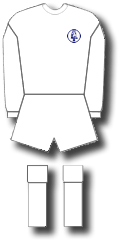
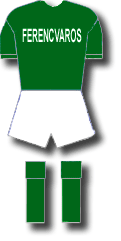 For Leeds United, 11 September 1968 brought a real moment of truth.
They faced mighty Ferencvaros of Budapest in the second leg of the Inter
Cities Fairs Cup final enjoying the advantage of a 1-0 victory in the
home leg almost a month before. They were desperate to become the first
British team to win the trophy and prove their many critics wrong.
For Leeds United, 11 September 1968 brought a real moment of truth.
They faced mighty Ferencvaros of Budapest in the second leg of the Inter
Cities Fairs Cup final enjoying the advantage of a 1-0 victory in the
home leg almost a month before. They were desperate to become the first
British team to win the trophy and prove their many critics wrong.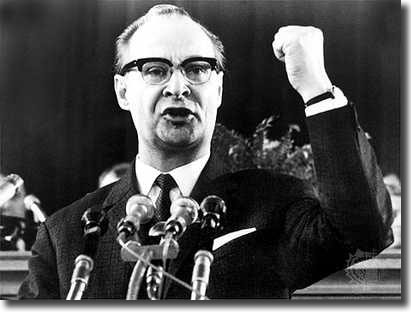 disruption
by possible boycotts over the Czechoslovak crisis', UEFA took the decision
to segregate eastern and western clubs in the European Cup and the European
Cup Winners' Cup.
disruption
by possible boycotts over the Czechoslovak crisis', UEFA took the decision
to segregate eastern and western clubs in the European Cup and the European
Cup Winners' Cup.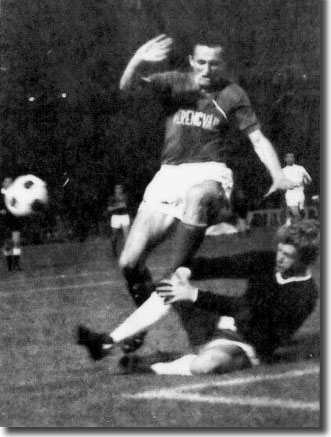 two-goal
margin to take the Cup. We will apply our tactics accordingly, with an
emphasis on attack. The best possible training Ferencvaros could have
had for this tie against Leeds was on Saturday.' He referred to a clash
against local rivals Honved, who had employed a nine-man defence. The
game was won with a last-minute goal from Varga.
two-goal
margin to take the Cup. We will apply our tactics accordingly, with an
emphasis on attack. The best possible training Ferencvaros could have
had for this tie against Leeds was on Saturday.' He referred to a clash
against local rivals Honved, who had employed a nine-man defence. The
game was won with a last-minute goal from Varga.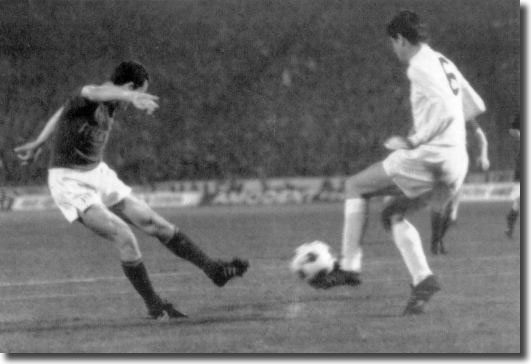 low
shot. Our left-back deflected it out of danger, and the pressure on us
was eased again for a brief while.'
low
shot. Our left-back deflected it out of danger, and the pressure on us
was eased again for a brief while.'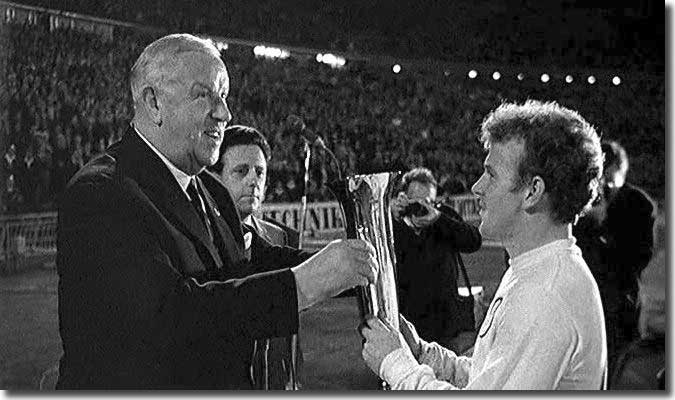 amazing and it was probably
my greatest performance for Leeds. Near the end of the game I made what
I regard as my best ever save. With minutes to go the Hungarians were
awarded a free kick outside the box in a very central position, to be
taken by their dead ball ace Novak. I lined up the wall to my right hand
side and stood just behind it to cover my left hand post. He hit the ball
as hard as he could and you could feel the crowd trying to suck the ball
into the net behind me. After Novak hit the ball I had only a split second
to see it as it dipped over the wall and I managed to dive full length
to my left and slightly behind me. It was important that I got a full
hand to it as it was hit so hard it rebounded off me and ended up halfway
up the stand.
amazing and it was probably
my greatest performance for Leeds. Near the end of the game I made what
I regard as my best ever save. With minutes to go the Hungarians were
awarded a free kick outside the box in a very central position, to be
taken by their dead ball ace Novak. I lined up the wall to my right hand
side and stood just behind it to cover my left hand post. He hit the ball
as hard as he could and you could feel the crowd trying to suck the ball
into the net behind me. After Novak hit the ball I had only a split second
to see it as it dipped over the wall and I managed to dive full length
to my left and slightly behind me. It was important that I got a full
hand to it as it was hit so hard it rebounded off me and ended up halfway
up the stand.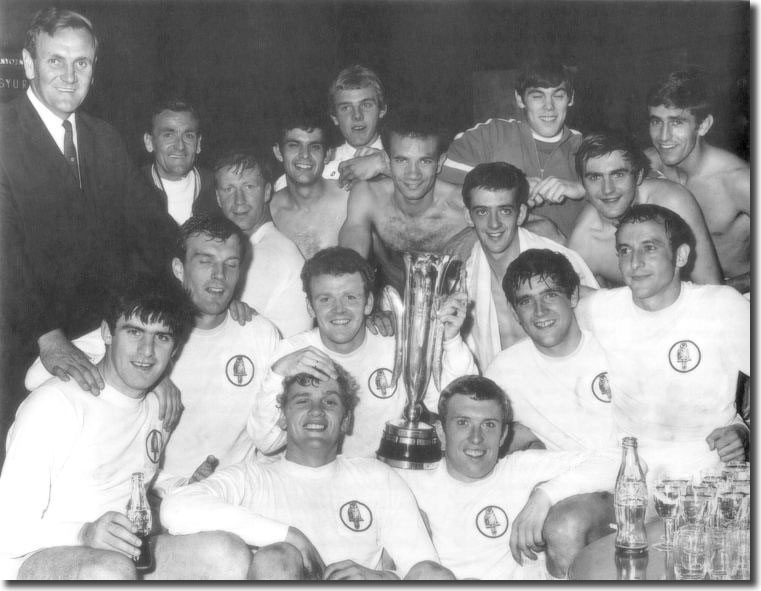 Alan Thompson in the Daily Express: 'Fingernails may need a manicure,
all adrenaline has been drained and the heart has taken a hammering, but
Leeds, those masters of deep and disciplined defence, held out against
an onslaught of green-shirted Hungarians that lasted for almost the entirety
of this game. How they did it is something of a miracle.'
Alan Thompson in the Daily Express: 'Fingernails may need a manicure,
all adrenaline has been drained and the heart has taken a hammering, but
Leeds, those masters of deep and disciplined defence, held out against
an onslaught of green-shirted Hungarians that lasted for almost the entirety
of this game. How they did it is something of a miracle.'